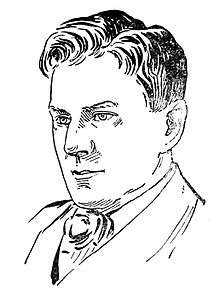Eugene Zimmerman
| Eugene Zimmerman | |
|---|---|
 | |
| Born |
May 26, 1862 Basel, Switzerland |
| Died | March 26, 1935 (aged 72) |
| Nationality | American |
| Area(s) | Cartoonist |
Eugene "Zim" Zimmerman (May 26, 1862 – March 26, 1935) was a Swiss-American cartoonist.[1]
Early life
He was born in Basel, Switzerland. His mother died and he was sent to live with relatives in Alsace. In 1867 his father, who was a baker, and an older brother emigrated to the United States. In 1868 Zimmerman was placed on a ship and followed them.[2]
Poverty and restricted circumstances characterized his early years as he moved from relatives to working in different jobs. In 1877 he became an apprentice sign painter and continued in this line of work for several years, nurturing a desire to become a professional cartoonist. By copying the work of cartoonists, he acquired the skills necessary to gather a portfolio, which gained him an interview in May 1883 with Joseph Keppler, the director of Puck Magazine. He was hired and began work at one of the most remarkable satirical magazines of the late 19th century. While he worked at Puck, he supplemented his income with lucrative freelance work. In 1885 he dropped the last portion of his signature and became known as Zim.[3][4]
Career
After two and a half years at Puck (from May 1883 to December 1885), Zim moved to Judge magazine, directed by Bernhard Gillam. Here he was better paid and enjoyed greater freedom in his selection of subjects. The following year he married Mabel Alice Beard of Horseheads, New York. In 1888, in search of a more gentle pace of life, he and Mabel moved to Horseheads. Zim then traveled to New York on alternate weeks to fulfill his commitments at the magazine. Like many contemporary cartoonists, Zim generated cartoons of all varieties, including some which could be considered offensive for their ethnic stereotypes. He remained at Judge until his retirement in 1912.
Becoming one of America's best-known cartoonists, he published more than 40,000 sketches in his lifetime. The illustrious painter William Merritt Chase, on a visit to the offices of Judge in 1897, voiced his praise for Zim's artistry and related that the artist Edwin Austin Abbey pasted his work in a book.
After his retirement from Judge, Zim was founder and first president of the American Association of Cartoonists and Caricaturists.
In Horseheads, Zim participated actively in the life of the community. He eventually designed the small town's Teal Park Bandstand, which happened to be located next to his house.[5]
He died on March 26, 1935.
Legacy
Horseheads preserves the artist's residence, known as Zim House, that possesses papers, sketches, and correspondence.[6]
Works

- This and That About Caricature. New York: Syndicate Press, 1905.
- Cartoons and Caricatures. Scranton, PA: Correspondence Institute of America, 1910.
- ZIM's Foolish History of Elmira and its Tributaries. Horseheads, NY: Chemung Valley Reporter, 1911.
- ZIM's Foolish History of Horseheads. Horseheads, NY: Eugene Zimmerman, 1911.
- In Dairyland. Horseheads, NY: Eugene Zimmerman, 1914.
- Language and Etticket of Poker. Horseheads, NY: Eugene Zimmerman, 1916.
- A Jug Full of Wisdom; Homespun Phoolosophy. Horseheads, NY: Eugene Zimmerman, 1916.
- Fire; Heroic Deeds for the Dingville Fire Department. Buffalo, NY: Holling Press, 1922.
- Foolish History of Horseheads. Horseheads, NY: Chemung Valley Reporter, 1927.
- Foolish History of Horseheads. Horseheads, NY: Eugene Zimmerman, 1929.
References
- ↑ Zim: the autobiography of Eugene Zimmerman Page 37 Eugene Zimmerman, Walter M. Brasch - 1988 "Chapter 1 ON MAY 26, 1862, IN BASEL, Switzerland, a country that would maintain its neutrality against the armies of Louis Napoleon's France and Otto von Bismarck's Germany, Eugene Zimmerman was born. His father was Joseph.."
- ↑ American national biography John Arthur Garraty, Mark Christopher Carnes, American Council of Learned Societies - 1999 Volume 24 - Page 246 935), cartoonist, was born Eugene Zimmerman in Basel, Switzerland, the second son of Joseph Zimmerman, a baker, and Amelie Klotz, who died in childbirth two years later. Unable to care for his three children and earn a living, Joseph .."
- ↑ Art Wood, Great Cartoonists: And Their Art, 2000 Page 124 "Zim was careful to emphasize the importance of detail in cartooning, particularly the drawing of hands and feet. Eugene "Zim" Zimmerman; Puck magazine"
- ↑ Jared Gardner, Projections: Comics and the History of Twenty-First-Century, 2012 ... - Page 198 "Other important and influential cartoonists in the illustrated weeklies were working with sequential narrative comics, including Eugene “Zim” Zimmerman at Puck and Judge, and F. P. W. “Chip” Bellew in Life. But Howarth, more than Zim and ..."
- ↑ Historic Preservation Field Services Bureau (August 1983). "National Register of Historic Places Inventory/Nomination:Teal Park". Retrieved 2008-09-10. and Accompanying 3 photos, from 1980
- ↑ Historic Preservation Field Services Bureau (August 1983). "National Register of Historic Places Inventory/Nomination:Zimmerman House". Retrieved 2008-09-11. and Accompanying photos, exterior and interior, from 1980
External links
| Wikimedia Commons has media related to Eugene Zimmerman. |
- Works by or about Eugene Zimmerman at Internet Archive
- ZIM: The Autobiography of Eugene Zimmerman edited by Walter M. Brasch
- Puck Magazine Online Exhibition at the United States Senate Website
- Zim Online Exhibit at ASIFA-Hollywood Animation Archive
- The Lost Art of Zim -- Cartoons and Caricatures edited by Joseph V. Procopio